江苏省启东中学高中英语 Unit 2 People on the move Grammar The
- 格式:doc
- 大小:79.08 KB
- 文档页数:2
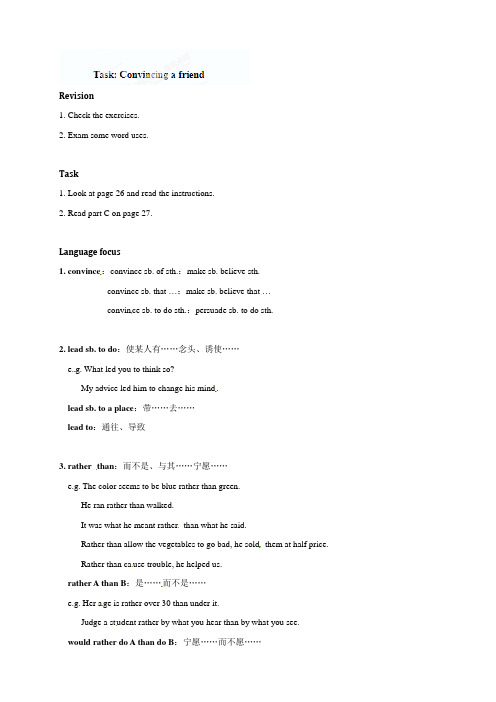
Revision1. Check the exercises.2. Exam some word uses.Task1. Look at page 26 and read the instructions.2. Read part C on page 27.Language focus1. convince:convince sb. of sth.:make sb. believe sth.convince sb. that …:make sb. believe that …convin ce sb. to do sth.:persuade sb. to do sth.2. lead sb. to do:使某人有……念头、诱使……e.g. What led you to think so?My advice led him to change his mind.lead sb. to a place:带……去……lead to:通往、导致3. rather than:而不是、与其……宁愿……e.g. The color seems to be blue rather than green.He ran rather than walked.It was what he meant rather than what he said.Rather than allow the vegetables to go bad, he sold them at half price.Rather than ca use trouble, he helped us.rather A than B:是……而不是……e.g. Her a ge is rather over 30 than under it.Judge a student rather by what you hear than by what you see.would rather do A than do B:宁愿……而不愿……or rather:更确切地说other than:除了4. contract:n. 合同:enter into / make a contract with sb.:与……订合同break / cancel / carry out a contract:违反/ 取消/ 履行合同vt. 订合同:contract with sb.contract to do sth.vi. 收缩:Metals contract in winter.5. It is expected that ….:希望……= Sb. / Sth. is expec ted to …e.g. It is expected that you hand in your exercise books by Friday.Everyone is expected to attend the meeting.Homework1. Read the passage on page 27.2. Preview ‘Projec t: The wandering Roma’.。
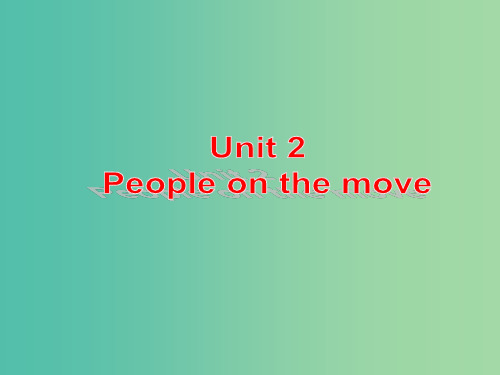
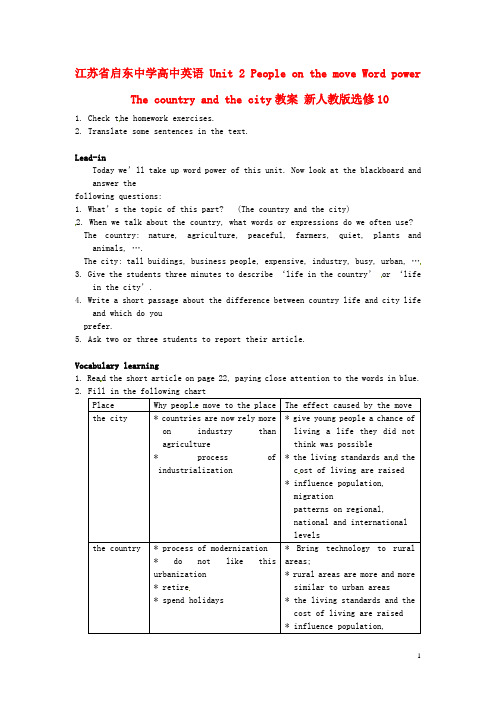
江苏省启东中学高中英语 Unit 2 People on the move Word power The country and the city教案新人教版选修101. Check t he homework exercises.2. Translate some sentences in the text.Lead-inToday we’ll take up word power of this unit. Now look at the blackboard and answer thefollowing questions:1. What’s the topic of this part? (The country and the city)2. When we talk about the country, what words or expressions do we often use? The country: nature, agriculture, peaceful, farmers, quiet, plants and animals, ….The city: tall buidings, business people, expensive, industry, busy, urban, …3. Give the students three minutes to describe ‘life in the country’or ‘lifein the city’.4. Write a short passage about the difference between country life and city lifeand which do youprefer.5. Ask two or three students to report their article.Vocabulary learning1. Rea d the short article on page 22, paying close attention to the words in blue.2. Fill in the following chartWhy peopl e move to the place* the living standards an d thec* retire3. Fill in the blanks in part B with suitable words in part A.4. Read part A on page 23 and finish part B with the right information.Prac ticeDo exercises on page 96, 100, 101 and 102 in KKL.Homewor k1. Finish exercises on page 103-106 in KKL.2. Preview ‘Grammar’.。

(江苏版)2016-2017学年高中英语Unit 2 People on the moveSection ⅠWelcome to the unit & Reading-Preparing教师用书牛津译林版选修10编辑整理:尊敬的读者朋友们:这里是精品文档编辑中心,本文档内容是由我和我的同事精心编辑整理后发布的,发布之前我们对文中内容进行仔细校对,但是难免会有疏漏的地方,但是任然希望((江苏版)2016-2017学年高中英语Unit 2 People on the moveSection ⅠWelcome to the unit & Reading-Preparing 教师用书牛津译林版选修10)的内容能够给您的工作和学习带来便利。
同时也真诚的希望收到您的建议和反馈,这将是我们进步的源泉,前进的动力。
本文可编辑可修改,如果觉得对您有帮助请收藏以便随时查阅,最后祝您生活愉快业绩进步,以下为(江苏版)2016-2017学年高中英语Unit 2 People on the moveSection ⅠWelcome to the unit & Reading-Preparing教师用书牛津译林版选修10的全部内容。
Unit 2 People on the moveFloridaCultureFrom the city of Tampa, Florida, you can go west in any direction and run into over 60 different beaches。
For a look into the traditional Florida, woods, wildlife, and less population, try the Hillsborough River parks and recreation areas all along the river.North of the lock, and south of it。
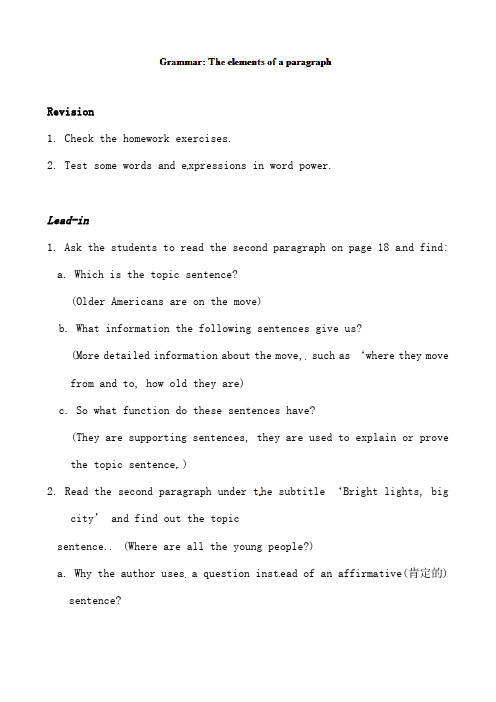
Revision1. Check the homework exercises.2. Test some words and expressions in word power.Lead-in1. Ask the students to read the second paragraph on page 18 a nd find:a. Which is the topic sentence?(Older Americans are on the move)b. What information the following sentences give us?(More detailed information about the move, such as ‘where they move from and to, how old they are)c. So what function do these sentences have?(They are supporting sentences, they are used to explain or prove the topic sentence.)2. Read the second paragraph under t he subtitle ‘Bright lights, bigcity’ and find out the topicsentence. (Where are all the young people?)a. Why the author uses a question instead of an affirmative(肯定的)sentence?(To catch the readers’eyes and make readers more interested in the topic)So topics in the form of a question is called a hook. (套)Reading1. Read the instructions and part 1 on page 24 and have a betterunderstanding of ‘topic sentence’ and ‘a hook’.2. Read part A on page 25 and choose the right topic sentence for eachparagraph. Give you reasons for your choice.3. Ask students to read part 2 on page 24 to know sth. more about supportingsentence and their function.4. Read the two paragraphs in part A on page 25 again and find out thesupporting sentences and transition words or phrases.5. Read part 3 on page 24 to understand what a concluding sentence is.Then read part B on page 25. 1) Fill in the blanks with transitions to complete the paragraph, 2) point out the topic and concluding sentences.6. Language focusa.PracticeDo exercises on page 180-184 in ZYB.Homework1. Finish the practice exercises.2. Preview ‘Task: Convincing a friend’。
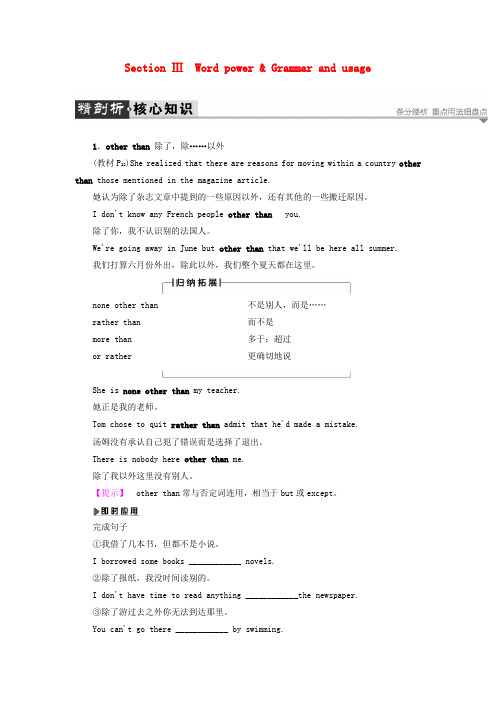
Section ⅢWord power & Grammar and usage1.other than 除了,除……以外(教材P22)She realized that there are reasons for moving within a country other than those mentioned in the magazine article.她认为除了杂志文章中提到的一些原因以外,还有其他的一些搬迁原因。
I don't know any French people other than you.除了你,我不认识别的法国人。
We're going away in June but other than that we'll be here all summer.我们打算六月份外出,除此以外,我们整个夏天都在这里。
none other than 不是别人,而是……rather than 而不是more than 多于;超过or rather 更确切地说She is none other than my teacher.她正是我的老师。
Tom chose to quit rather than admit that he'd made a mistake.汤姆没有承认自己犯了错误而是选择了退出。
There is nobody here other than me.除了我以外这里没有别人。
【提示】other than常与否定词连用,相当于but或except。
完成句子①我借了几本书,但都不是小说。
I borrowed some books ____________ novels.②除了报纸,我没时间读别的。
I don't have time to read anything ____________the newspaper.③除了游过去之外你无法到达那里。
Brainstorming1. Play a game: Ask the students around you to fill the form:Who From where When Why12342. Ask some of the students to report their survey.Example:Tom is my desk mate. He comes from Nantong in 2003. He comes here to study / do some business here / in Qidong.3. Questionsa. What is the topi c of the unit we are learning now? (People on the move)b. What do you think the phrase ‘on the move’ mean? (To move to another place)c. What do you think the topic is about? (Who are on the move and why they are on move)d. In your opinion, who are on the move and why they are on the move?Sharing informationPlease look at the five pictures on page 17 and fill in this chartWhere the people move Why the people move* to another country* to a warm place* to a university abroad * to a city* to a new flat * have got a new job there; to experience a new culture* have become tired of the snow* to st udy so as to get a better job when returnin g home* can’t find jobs in the small town* need more space to live togetherDiscussion1. Nowadays, more and more people are one the move. It has become a world trend. In China, a lot of pe ople are on the move, from country to cities, from north to south. This has caused some social problems. Now let’s have a discussion in groups of two or four on ‘advantages and disadvantages’ of this trend.2. Ask some groups to report their results.3. Answer the three questions on page 17.4. More questions:a. If you could study or work in a foreign country, which country would you like to go? Why?b. Which do you think is the most suitable place in China for young people to live andwork? Why?c. Which country is the most suitable one for people to live in? Why?d. Why do many people in China move from the country move to the cities in China? Whatdo you think of this social phenomenon?5. Do the reading on page 91 and 92 in KKL.HomeworkPreview ‘Reading: Population mobility in the USA’.。
江苏省启东中学高中英语 Unit 2 People on the move Grammar The elements of a paragraph教案新人教版选修10Revision1. Check the homework exercises.2. Test some words and e xpressions in word power.Lead-in1. Ask the students to read the second paragraph on page 18 a nd find:a. Which is the topic sentence?(Older Americans are on the move)b. What information the following sentences give us?(More detailed information about the move, such as ‘where they move from and to, how old they are)c. So what function do these sentences have?(They are supporting sentences, they are used to explain or prove the topic sentence.)2. Read the second paragraph under t he subtitle ‘Bright lights, big city’ andfind out the topicsentence. (Where are all the young people?)a. Why the author uses a question inst ead of an affirmative(肯定的) sentence? (To catch the readers’ eyes and make readers more interested in the topic) So topics in the form of a question is called a hook. (套)Reading1. Read the instructions and part 1 on page 24 and have a better understanding of ‘topic sentence’ and ‘a hook’.2. Read part A on page 25 and choose the right topic sentence for each paragraph. Give you reasons for your choice.3. Ask students to read part 2 on page 24 to know sth. more about supporting sentenceand their function.4. Read the two paragraphs in part A on page 25 again and find out the supporting sentences and transition words or phrases.5. Read part 3 on page 24 to understand what a concluding sentence is. Then read part B on page 25. 1) Fill in the blanks with tran sitions to complete the paragraph, 2) point out the topic and concluding sentences.6. Language focusa.PracticeDo exercises on page 180-184 in ZYB.Homework1. Finish the practice exercises.2. Preview ‘Task: Convincing a friend’。
江苏省启东中学高中英语 Unit 2 People on the move Word study教案新人教版选修101. look at:1) 思考、考虑、研究,(和will、would连用,用于否定结构)e.g. I wouldn’t look at such a small offer.They refuse to look at my suggestion.I wouldn’t look at anything under 3000 yuan in price.2) 看(问题)、看待e.g. You may look at things that way, but I won’t.That’s the way I look at it.‘look’ phrases: look after;look back on;look down on look for;look forward to;look inlook sb. in the eye / face;look into;look onlook one’s age;look out (for);lookaround look over;look through;look uplook sb. up and down2. age:vt. / vi. 变老、衰老:sb. age / sth. age sb.e.g. After his retirement, he aged visibly.Illness aged her so quickly.You have aged a lot since I last saw you.n. 年龄、时代、长时间e.g. What’s your age?She looks old for her age.It’s ages since we last met.‘age’的常用短语:at the age of …; die of old age; act (be) one’s agethe Middle Ages; the atomic agea middle-aged woman; a boy aged 113. head:vt./ vi. 1) 朝(……方向)前进e.g. You are heading north now.The train is heading from Guangzhou towards Beijing.2) 当……的头、首领e.g. As monitor, she heads the class.After his father died, he heads the company.3) 使……前往:head sb. / sth. ….e.g. The captain headed the ship northward.We headed the boat out to sea.head for / be headed for:前往、开往……e.g. In the gold rush, many people headed for America.After school, the students head for their homes in different directions.n. 头、首长e.g. He is taller than his sister by a head.Two heads are better than one.She has a clear head.Use your head, and / then you’ll find a way.‘head’常用短语:the head of a family; a head teacher; five head of cattlesth. enter one’s head; from head to foot;stand on one’s headhave a headache4. account for:说明……的原因、解释了……e.g. Your explanation can’t account for what you have done.Can you account for your absence from school yesterday?The man can’t account for how he has so much money.account:n. 解释、说明:give an account of ….:对……作说明银行账户:open an account叙述、报道e.g. Have you read the account in today’s paper?You may have read some account of the matter.on account of:because ofe.g. The train was delayed on account of the bad weather.take ….into account = take account of …:对……加以考虑5. slip:滑、滑倒、滑落;e.g. The hammer slipped and hurt his foot.The car slipped at the corner on the road.悄悄移动、溜进(出)I slipped on the ice and broke my leg.It is impossible to slip into the room unnoticed.She slipped away from the party to make a phone call.偷偷地给;不知不觉地陷入(状态、习惯)He slipped me a letter. = He slipped a letter to me.I slipped a dollar bill into the waiter’s hand.引申:1) 遗忘、忽略e.g. Sorry, but your name has slipped my mind.slip of tongue:口误6. exchange:交换……、互换(问候等)e.g. They exchanged stamps.They only exchanged a few words because they were in a hurry.exchange sth. with sb.:和……交换……e.g. I often exchange information with him.Shall I exchange seats with you?exchange A for B:以……换…… = change A for Be.g. I bought this tie here yesterday, but can I exchange it for that one?Where can I exchange dollars for pounds?in exchange (for…):为了换(……)e.g. I gave her a sweater in exchange for her skirt.7. take advantage of:利用(出境、弱点、机会)e.g. I can’t take advantage of your good nature.You can’t take advantage of your position to do that.He took advantage of the moment to leave the room.Let’s take advantage of the good weather to get in the crops.‘advantage’ phrases:have / give sb. an advantage over ….:(使某人)在……有利e.g. They have an advantage over me. You have a choice and I have to accept. The great advantage you have over me is that you know English well.to one’s advantage:对……有利e.g. More practice will be to your advantage.The score is 4: 3 to our advantage.8. hook:vt. 吸引、使……上瘾:sth. hook sb. = be hooked one.g. Computer games hooked many students.The man is hooked on wine.挂(构上)、钓到鱼……e.g. Will you hook my dress for me?How many fish have you hooked?n. 钩、鱼钩9. make use of:use:利用:make better / the best use of = make the most ofe.g. You should make (the best) use of this chance.He made use of his free time to learn French.‘use’ phrases:in use; It is (of) no use doing = It is no use to do = There is no use doing ..be of (great) use = be (very) usefulput ….to use:使用、利用10. wander:vi. / vt. 到处走、徘徊、e.g. He was wandering about in the forest.I spent my vacation wandering through France.After tea I wandered about alone about the town.They wandered the jungle, searching for food.c.f. wonder11. submit:vi. / vt. 服从、屈服:submit (oneself) to sb. / sth.e.g. I was unwilling to submit (myself) to his orders.She submitted to her parents’ decision at last.I refuse to submit myself to his control.After being defeated, they submitted to the enemy.提交:submit sth. to sb.e.g. He submitted the report on the matter to the committee.You must submit you request to your teacher.submission:屈服、顺从、投降;上交12. vote:vi. 投票vote on:就……投票表决e.g. We’ll vote on the question.As we can’t agree on the matter, let’s vote on it.The chairman asked us to vote on the plan.vote for / against…:投票支持/反对……e.g. Only seven members voted against the plan.We all voted for his being our monitor.Will you vote for or against the suggestion?vote down:投票否决e.g. We voted down the bill.His suggestion was voted down.vote to do sth. / that …:投票去做/决定……e.g. We voted to accept the decision.They voted that the game should be put off.n. 投票:cast a vote13. take to:开始从事、喜欢、沉溺于e.g. I took to her at once.He has taken to drinking recently.How has Tom taken to his new school?At the age of 40, he took on writing plays.* take ….to heart:把……牢记在心take to (one’s) bed:卧病在床take to one’s heart:喜欢、对……有好感‘take’ phrases:take a chance:碰运气;take a risk / risks:冒险take a seat:坐下;take an interest in …:对……感兴趣take account of:考虑;take action on:对……采取措施take advantage of:利用;take after:长得像、性格像take …as…:看作、认为;take back:收回take sb. back to:使……回想起;take sb. by surprise:使……出其不意take charge of:管理;take control of:控制住take ..for:(误)认为;take …for granted:想当然认为……take …for instance:拿……为例;take hold of:抓住take in:接纳、留宿、明白、欺骗;take …into account:考虑到take …into consideration:考虑到;take it easy:别急、不要紧张take notice of:理睬、注意;take notes:作记录take office:就职;take on:从事/雇用/上车/呈现/风行take one’s own life:自杀;take your time:慢慢来take over:接管;take pains:下功夫、努力take part in:参加;take place:发生take the place of:替代;take pride in:以……为豪take trouble to do sth.:费事、下功夫take turns:轮流= in turntake up:开始学/做、占据14. plot:vt. / vi. 秘密、秘密策划(做坏事)plot (to do) sth.e.g. They plotted the murder of the king.He plotted to rob the bank two weeks ago.They are plotting to murder the president on his arrival.n. 情节。
Section Ⅱ Welcome to the unit &Reading—Language PointsⅠ.高频单词1.tough adj. 难熬的;严厉的;坚强的2.slip vi.& n. 滑倒,滑动3.boom n. & vi. 激增,繁荣4.flexible adj. 能适应新情况的,灵活的;有弹性的5.rent n. 租金vt. 租用,租借;出租6.privilege n. & vt. 荣幸;特权;给予特权;特别优待7.edition n.(报刊的)一期;版本→editor_n._编辑,编者8.retire vt.& vi. 退休,(令)退职→retirement n. 退休9.elect vi.& vt. 选举;选择(做某事)→election n. 选举10.waitress n. 女服务员→waiter n. (男)服务员Ⅱ.重点短语1.be tired of 对……感到厌烦2.look at 研究,考虑;朝……看3.be on the move 迁移中,行进中4.be home to 是……的所在地5.a variety of 各种各样的6.turn_into 变成7.make_sense 是明智的;是有道理的8.cater_to_sb._/sth. 迎合,满足需要9.adapt_to 适应10.one’s_(own)_flesh_and_blood 亲骨肉,亲人Ⅲ.经典句型1.[句型展示] Younger people might like snow and cold, but for people my age, such weather is very tough; snow can turn into ice, which_is_easy_to_slip_on.年轻一点的人可能喜欢雪和严寒,但对我这种年纪的人来说,那样的天气很难熬,雪会结成冰,很容易使人滑倒。
江苏省启东中学高中英语 Unit 2 People on the move Grammar The elements of a paragraph教案牛津译林版选修10
Revision
1. Check the homework exercises.
2. Test some words and expressions in word power.
Lead-in
1. Ask the students to read the second paragraph on page 18 and find:
a. Which is the topic sentence?
(Older Americans are on the move)
b. What information the following sentences give us?
(More detailed information about the move, such as ‘where they move from and to, how old they are)
c. So what function do these sentences have?
(They are supporting sentences, they are used to explain or prove the topic sentence.)
2. Read the second paragraph under the subtitle ‘Bright lights, big city’ and find out the topic
sentence. (Where are all the young people?)
a. Why the author uses a question instead of an affirmative(肯定的) sentence?
(To catch the readers’ eyes and make readers more interested in the topic)
So topics in the form of a question is called a hook. (套)
Reading
1. Read the instructions and part 1 on page 24 and have a better understanding of ‘topic sentence’ and ‘a hook’.
2. Read part A on page 25 and choose the right topic sentence for each paragraph. Give you reasons for your choice.
3. Ask students to read part 2 on page 24 to know sth. more about supporting sentence and their function.
4. Read the two paragraphs in part A on page 25 again and find out the supporting sentences and transition words or phrases.
5. Read part 3 on page 24 to understand what a concluding sentence is. Then read part
B on page 25. 1) Fill in the blanks with transitions to complete the paragraph, 2) point out the topic and concluding sentences.
6. Language focus
a.
Practice
Do exercises on page 180-184 in ZYB.
Homework
1. Finish the practice exercises.
2. Preview ‘Task: Convincing a friend’。